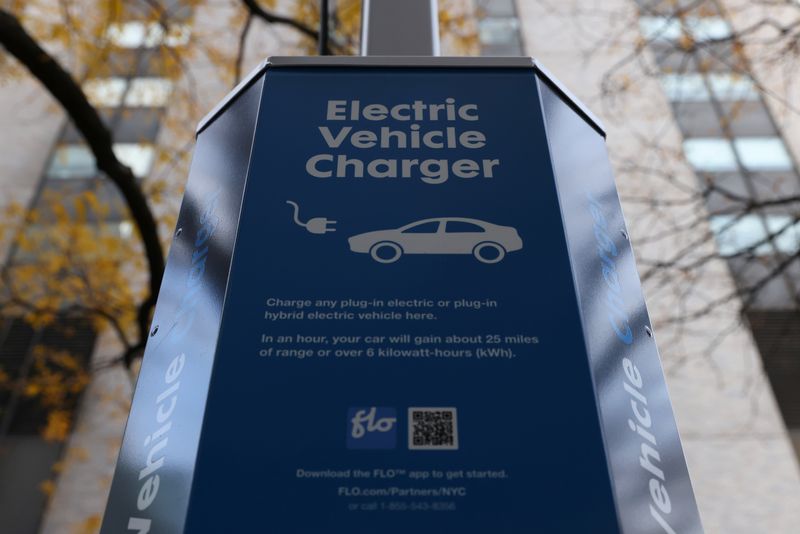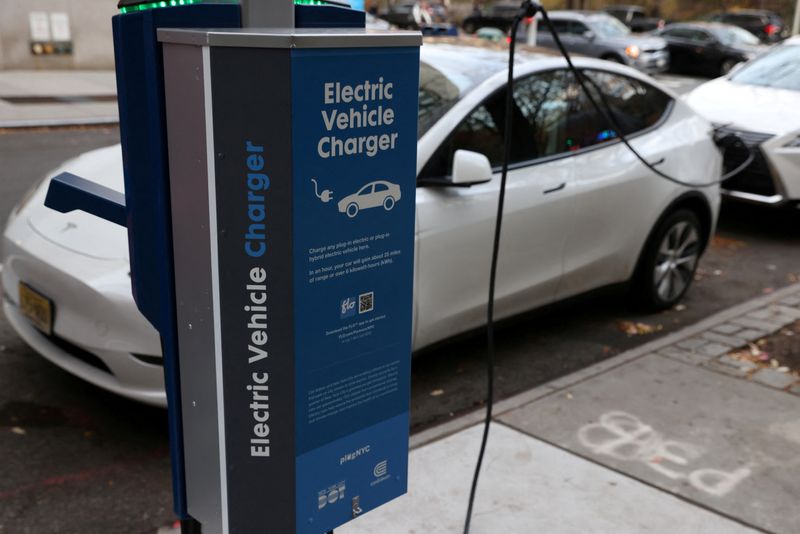By David Shepardson
WASHINGTON (Reuters) - The U.S. Energy Department (DOE) on Monday proposed reducing electric vehicles' (EV) mileage ratings to meet government fuel economy requirements, a move that could force automakers to sell more low-emissions cars or improve conventional models.
DOE wants to significantly revise how it calculates the petroleum-equivalent fuel economy rating for electric and plug-in electric hybrids for use in the National Highway Traffic Safety Administration's (NHTSA) Corporate Average Fuel Economy (CAFE) program.
The current system has not been updated in more than two decades.
"Encouraging adoption of EVs can reduce petroleum consumption but giving too much credit for that adoption can lead to increased net petroleum use because it enables lower fuel economy among conventional vehicles, which represent by far the majority of vehicles sold," DOE said in its proposed regulation.
Miles Per Gallon equivalent (MPGe) ratings are determined by using values for national electricity, petroleum generation and distribution efficiency and driving patterns.
Environmental groups note fuel economy ratings for EVs is far higher for determining CAFE compliance than those listed on the government's consumer website.
The Alliance for Automotive Innovation, which represents major automakers, warned last year that lowering the values could have far-reaching implications and would discourage EV adoption.
The group said on Monday it was unclear how the proposed DOE calculation would be incorporated in future CAFE standards.
A Volkswagen (ETR:VOWG_p) ID.4 EV with a current 380.6 MPGe under CAFE would get 107.4 MPGe under the DOE proposal, while a Ford F-150 EV drops from 237.1 to 67.1 MPGe and Chrysler Pacifica plug-in hybrid falls from 88.2 to 59.5 MPGe.
The Natural Resources Defense Council and Sierra Club petitioned for the change in 2021, arguing "excessively high imputed fuel economy values for EVs means that a relatively small number of EVs will mathematically guarantee compliance without meaningful improvements in the real-world average fuel economy of automakers' overall fleets."
Tesla (NASDAQ:TSLA) backed the environmental groups petition.
The Environmental Protection Agency on Wednesday will propose new rules to spur sweeping cuts in vehicle emissions that will push automakers towards a big increase in electric vehicle sales, sources told Reuters last week.
The 2027 to 2032 model year pollution cuts are expected to result in at least half of the new U.S. vehicle fleet by 2030 being electric or plug-in hybrids, sources said, in line with a goal President Joe Biden outlined in 2021.

NHTSA is expected to soon propose parallel new stringent CAFE requirements. In 2022, NHTSA sharply boosted CAFE standards for vehicles, reversing former President Donald Trump's rollback.
Automakers buy credits or pay fines if they cannot meet CAFE requirements. Stellantis, then known as Fiat Chrysler, paid $152.3 million in total CAFE fines for 2016 and 2017 and faces additional civil penalties. In 2022, NHTSA more than doubled CAFE penalties.
